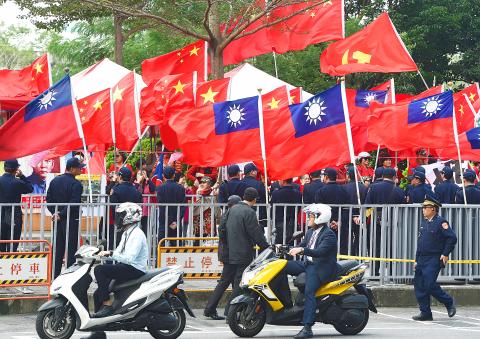Following a day of silence, the Chinese Nationalist Party (KMT) yesterday issued a statement challenging Chinese President Xi Jinping’s (習近平) definition of the so-called “1992 consensus,” saying that the “one country, two systems” framework is not part of the consensus.
“Xi’s remarks about a Taiwan version of the ‘one country, two systems’ model is not part of the content espoused by the ‘1992 consensus.’ Given that both sides of the Taiwan Strait are governed by separate governments, the ‘one country, two systems’ model unfortunately would not receive the support of the majority of Taiwanese,” the statement said.
Reiterating its definition of the “1992 consensus,” the KMT said that it was reached by the Straits Exchange Foundation and the Association for Relations Across the Taiwan Straits after they were authorized in November 1992 to engage in negotiations on the matter.

Photo: Liao Chen-huei, Taipei Times
In essence, the “1992 consensus” means that both sides of the Taiwan Strait adhere to the “one China” principle, but are allowed to have their own interpretations of what “China” means, it said.
“The ‘1992 consensus’ not only reflects the nature of cross-strait relations, which is seeking common ground while respecting differences, but also underlines the objective reality [of the ties] and conforms to both sides’ regulations,” the KMT said.
The statement came after Xi on Wednesday included “national unification” as part of his definition of the “1992 consensus” in a speech in Beijing to mark the 40th anniversary of the 1979 “Message to Compatriots in Taiwan,” which called for the unification of “China,” an end to military confrontation across the Taiwan Strait and expanded cross-strait interactions.
Xi also announced a plan to explore a Taiwan version of the “one country, two systems” model to achieve his goal of peaceful unification.
The Chinese leader’s definition of the “1992 consensus” stands in stark contrast to that provided over the years by the KMT, which has maintained that it allows room for Taiwan to interpret “China” as being the Republic of China (ROC).
The KMT’s Mainland Affairs Department on Wednesday held a meeting to discuss Xi’s speech, KMT Culture and Communications Committee acting director-general Tang Te-ming (唐德明) said.
In its statement, the KMT also reiterated its “unwavering opposition” to Taiwanese independence, saying that the ROC is already an independent sovereign state according to its Constitution.
“Cross-strait interactions and development must continue to move forward peacefully, because it is the hope of the public that both sides can expand and deepen their exchanges,” the KMT said, adding that the party, its caucus and local government leaders all look forward to making concerted efforts to ensure the peaceful development of cross-strait relations and a win-win situation for both sides.

MAKING WAVES: China’s maritime militia could become a nontraditional threat in war, clogging up shipping lanes to prevent US or Japanese intervention, a report said About 1,900 Chinese ships flying flags of convenience and fishing vessels that participated in China’s military exercises around Taiwan last month and in January last year have been listed for monitoring, Coast Guard Administration (CGA) Deputy Director-General Hsieh Ching-chin (謝慶欽) said yesterday. Following amendments to the Commercial Port Act (商港法) and the Law of Ships (船舶法) last month, the CGA can designate possible berthing areas or deny ports of call for vessels suspected of loitering around areas where undersea cables can be accessed, Oceans Affairs Council Minister Kuan Bi-ling (管碧玲) said. The list of suspected ships, originally 300, had risen to about

DAREDEVIL: Honnold said it had always been a dream of his to climb Taipei 101, while a Netflix producer said the skyscraper was ‘a real icon of this country’ US climber Alex Honnold yesterday took on Taiwan’s tallest building, becoming the first person to scale Taipei 101 without a rope, harness or safety net. Hundreds of spectators gathered at the base of the 101-story skyscraper to watch Honnold, 40, embark on his daredevil feat, which was also broadcast live on Netflix. Dressed in a red T-shirt and yellow custom-made climbing shoes, Honnold swiftly moved up the southeast face of the glass and steel building. At one point, he stepped onto a platform midway up to wave down at fans and onlookers who were taking photos. People watching from inside

Japan’s strategic alliance with the US would collapse if Tokyo were to turn away from a conflict in Taiwan, Japanese Prime Minister Sanae Takaichi said yesterday, but distanced herself from previous comments that suggested a possible military response in such an event. Takaichi expressed her latest views on a nationally broadcast TV program late on Monday, where an opposition party leader criticized her for igniting tensions with China with the earlier remarks. Ties between Japan and China have sunk to the worst level in years after Takaichi said in November that a hypothetical Chinese attack on Taiwan could bring about a Japanese

The WHO ignored early COVID-19 warnings from Taiwan, US Deputy Secretary of Health and Human Services Jim O’Neill said on Friday, as part of justification for Washington withdrawing from the global health body. US Secretary of State Marco Rubio on Thursday said that the US was pulling out of the UN agency, as it failed to fulfill its responsibilities during the COVID-19 pandemic. The WHO “ignored early COVID warnings from Taiwan in 2019 by pretending Taiwan did not exist, O’Neill wrote on X on Friday, Taiwan time. “It ignored rigorous science and promoted lockdowns.” The US will “continue international coordination on infectious